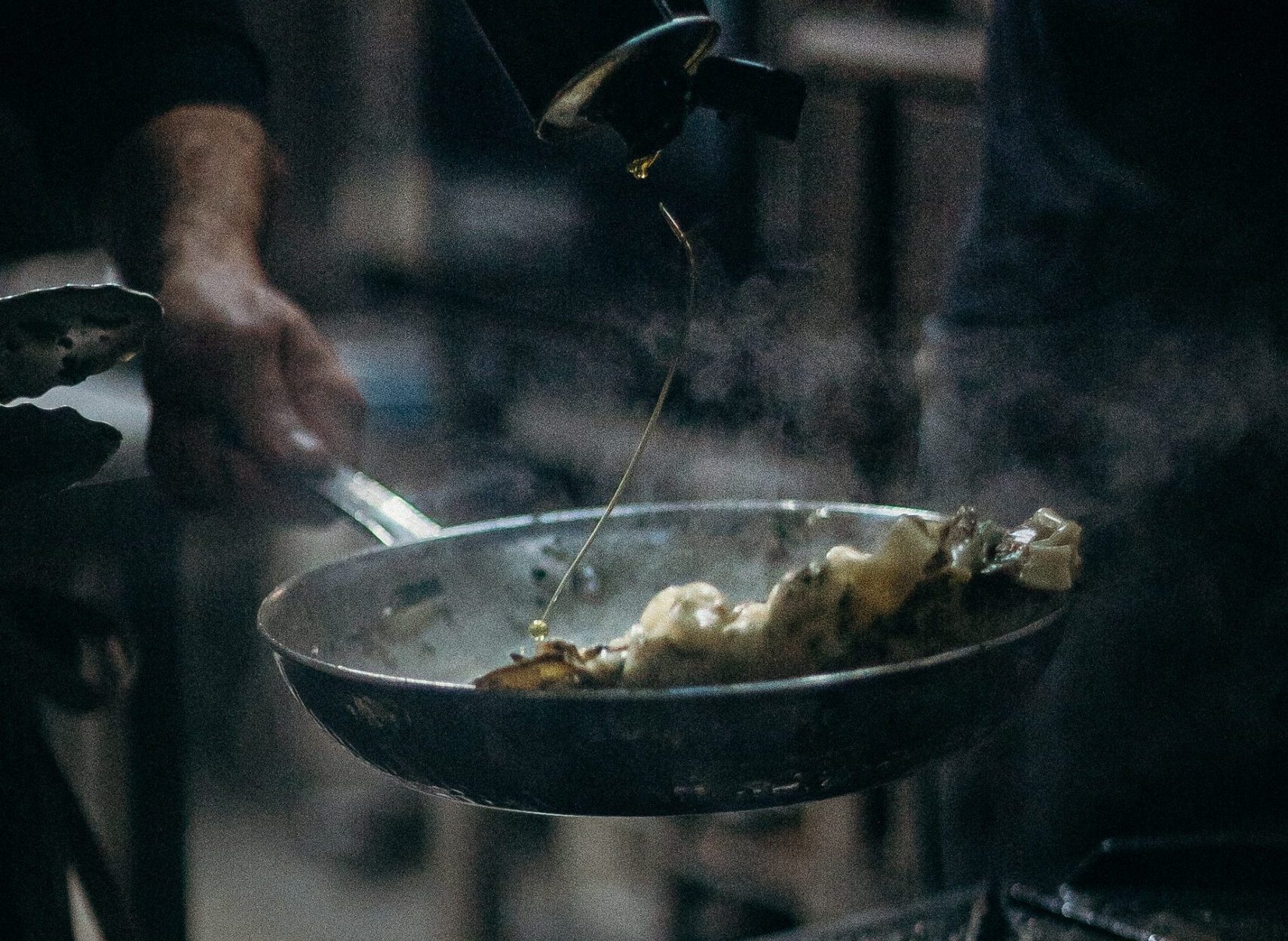Have you ever been in the midst of a sweaty, late-night booty call and thought “I’m dying for a pain au chocolat”? Throughout my teenage-to-adult life, sex and food have always competed to be at the forefront of my desires, every so often combining in a conflagration of decadent, sensory pleasure. Outside the bedroom, their association is equally prevalent; from simple aphrodisiacs to phallic foods, this power pairing has burrowed its way into our everyday lives through cookbooks, food blogs, mukbangs and ASMR. Naturally, sex has also been integrated into our food-related popular culture. Defined by hypersexualised fiction and reality shows, it increasingly feels like an indispensable tool to spice up the monotonous task of casual cooking for the general public. This thematic fusion has given rise to several sexualised genre tropes within the culinary world, some of which, though often quite amusing, are ultimately based on gendered stereotypes.
“The original Sexually-Competent Dirtbag is, without a doubt, Marco Pierre White, whose first cookbook White Heat featured images of him caressing dead sharks, smoking in kitchens, and spoon-feeding supermodels his signature fussy French food.”
One of the staples of contemporary culinary media is the Sexually-Competent Dirtbag: a straight, white, tattoo-clad, leather-wearing male chef. One whose pastimes mainly consist of smoking, motorbike riding, listening to rock music and doing drugs. This trope emerged in the 90s when the culinary industry experienced a sharp rise in male chefs. The original Sexually-Competent Dirtbag is, without a doubt, Marco Pierre White, whose first cookbook White Heat featured images of him caressing dead sharks, smoking in kitchens and spoon-feeding supermodels his signature fussy French food. White reframed cooking as a masculine performance, an activity to prove one’s manhood through the laborious but creative task that is professional cooking. A decade later came Anthony Bourdain’s Kitchen Confidential, recounting his action-packed tales from the start of his career in the kitchen. The book cemented Bourdain as an haute-cuisine casanova with its excess of lewd references, providing the readers with a painstakingly surface-level and exculpatory insight into the prevalence of sexual harassment in the culinary world. In more recent popular culture, Boiling Point’s Andy Jones (Stephen Graham) and The Bear’s Carmen Berzatto (Jeremy Allen White) have deconstructed this trope. Both characters demonstrate that beneath the Dirtbag’s hypermasculine facade often lies an aching void of addiction, trauma and regret. Despite the fact that both pieces are largely free of sexual connotations, both Graham and White’s characters are nonetheless portrayed on social media as Sexually-Competent Dirtbags’. This reasserts that tropes are not simply crafted for an audience, but can just as easily be projected onto these characters by its viewers.
Another sexualised culinary trend romanticises the self-fulfilled Domestic Goddess: a warm, nourishing stay-at-home wife, the epitome of upper-middle-class living, free to casually whip up a lavish five-course meal for her husband and 2.4 children from the comfort of her own spotless, marble-counter designer kitchen. This trope is commonly associated with (and projected onto) food bloggers, whose posts explicitly romanticise this unobtainable lifestyle. Don’t get me wrong, I am fascinated by this persona, but I’m convinced this is only because there is so little conversation surrounding what the lifestyle actually demands in terms of time, money, and emotional availability.
Nigella Lawson is famously lauded as The Domestic Goddess, as the media persistently celebrates her sex appeal, classic beauty and charisma. These are all embodied in her frequent ad-libbed innuendos: “the closer the bone, the sweeter the meat.” Lawson has repeatedly denounced the media’s over-sexualisation of her work, claiming that home cooking, as per her own words, is an “emotionally nourishing” activity, a means of expressing self-care and pleasure — not an activity subject to her sexualisation. Even if she does exploit her sexual appeal, ultimately, the question is not whether to demonise her for her flirtatious persona, but whether this image is her own creation or the result of lecherous producers attempting to transform her cooking into softcore porn.
Moving onto perhaps more psychoanalytical terrain, the presentation of professional cooking as masculine performance naturally leads us to the Angry Chef: a foul-mouthed, plate-chucking dictator who makes his subordinates’ lives a living hell. Accordingly, Gordon Ramsay in Hell’s Kitchen represents the ultimate Freudian father figure, emotionally castrating the underperformer at every opportunity. Failing to balance a delicate lamb jus is a marker not just of failure, but impotence; the head chef’s omniscient eye will always notice the flaws you are attempting to hide and — like Colette in Ratatouille — will not hesitate to humiliate you.
“Where Ramsay represents the Freudian father, Paul Hollywood is a walking Electra complex, whose masculine presence you want to appease, not out of fear, but adulation.”
Authority and obedience are the Angry Chef’s mantras, a relationship of dominance and submission that, if improperly observed, will result in painful emasculation. Where Ramsay represents the Freudian father, Paul Hollywood is a walking Electra complex, whose masculine presence you want to appease, not out of fear, but adulation. Through his masculine presence in the kitchen (or The Great British Bake-Off tent), he pushes his apprentice towards perfection with a supportive and caring — but nonetheless firm — paternal demeanour, where crowning achievements are potentially rewarded with an elusive Hollywood handshake. Thus, by combining Hollywood’s imposing masculine presence with the restrained and uplifting format of Bake-Off, he injects sex appeal into the generally wholesome process that is baking.
Overall, while food is ultimately a convenient stand-in for sex and desire, cookery can also present a medium for conveying dominance and admiration. Through stunning Battenberg cakes and unfortunately undercooked sea bass, programmes such as The Great British Bake-Off or Hell’s Kitchen examine more unconventional ways to create sexual tension through food, rather than by over-using tired innuendos and on-the-nose scantily-clad kitchen shoots. Broadly speaking, these tropes promote unattainable (and undeniably heteronormative) fantasies and ideals, associating femininity in the culinary world with domesticity and family life, while reaffirming the male-dominated nature of professional cooking. Cream pie, anyone?






